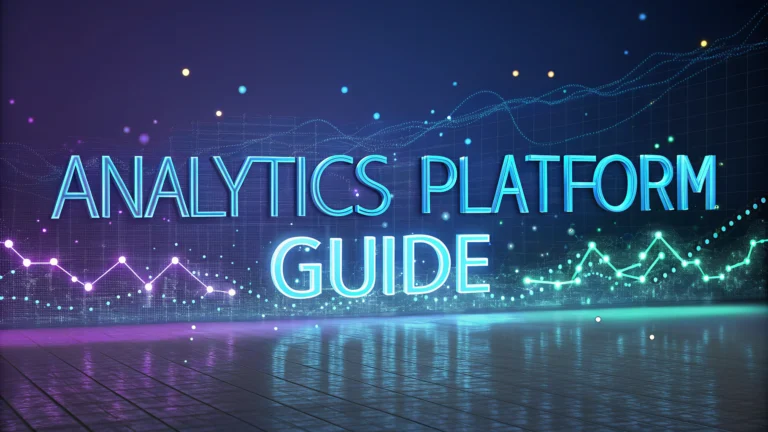Analytics platforms transform raw data into meaningful business insights through sophisticated processing and visualization tools.
Modern platforms integrate multiple data sources, enabling companies to create comprehensive dashboards that track key performance indicators in real-time.
Successful implementation requires understanding your organization’s specific reporting needs and selecting a platform with flexible data integration capabilities.
- Data Collection: Aggregate information from multiple sources
- Processing: Transform raw data into actionable insights
- Visualization: Create intuitive graphical representations
Key Features of Top Analytics Platforms
Enterprise-grade analytics platforms typically offer advanced features like predictive modeling, machine learning integration, and customizable reporting interfaces.
Robust security protocols ensure data privacy and compliance with international regulatory standards.
Look for platforms supporting real-time analytics, multi-device accessibility, and seamless cloud integration.
| Feature | Importance |
|---|---|
| Machine Learning | High |
| Data Visualization | Critical |
Selecting the Right Analytics Solution
Evaluate analytics platforms based on scalability, ease of use, integration capabilities, and total cost of ownership.
Small businesses might prefer user-friendly platforms with lower complexity, while enterprises need highly customizable solutions.
Consider platforms offering free trials to test compatibility with your existing technology infrastructure.
Implementation Best Practices
Start with a clear data strategy that aligns technical capabilities with specific business objectives.
Train team members on platform functionality to maximize potential and ensure effective usage.
Regularly audit and optimize your analytics approach to maintain relevance and efficiency.
Future Trends in Analytics Platforms
Artificial intelligence and predictive analytics are rapidly transforming how businesses leverage data-driven insights.
Emerging platforms are focusing on more intuitive interfaces and faster processing speeds.
Expect increased emphasis on privacy-first design and enhanced data protection mechanisms.
Advanced Analytics Techniques
Advanced analytics represents the cutting edge of business intelligence, enabling organizations to move beyond descriptive reporting into predictive and prescriptive insights. Machine learning algorithms can now uncover complex patterns and relationships within massive datasets that traditional analytical methods might miss.
Predictive modeling techniques allow businesses to forecast future trends, anticipate customer behaviors, and make proactive strategic decisions. By leveraging statistical models and historical data, companies can develop more accurate risk assessments and optimization strategies.
Techniques like regression analysis, neural networks, and decision tree algorithms provide sophisticated tools for extracting deeper insights. These methods enable organizations to transform raw data into strategic intelligence that drives competitive advantage.
Cross-functional analytics integration becomes crucial, connecting insights across marketing, sales, operations, and financial domains. This holistic approach ensures that data-driven strategies are comprehensive and aligned with broader organizational objectives.
Data Governance and Compliance
Robust data governance frameworks are essential for maintaining the integrity, security, and regulatory compliance of analytics platforms. Organizations must develop comprehensive policies that address data collection, storage, processing, and sharing protocols.
Regulatory environments like GDPR, CCPA, and industry-specific compliance requirements demand meticulous data management strategies. Analytics platforms must incorporate built-in mechanisms for data anonymization, consent management, and transparent user controls.
Implementing role-based access controls and encryption technologies helps protect sensitive information from unauthorized access. Regular security audits and vulnerability assessments become critical components of a comprehensive data governance approach.
Metadata management and data lineage tracking provide additional layers of transparency and accountability. Organizations can maintain clear records of data transformations, usage, and access history, supporting both internal governance and external compliance requirements.
Cloud-Based Analytics Ecosystems
Cloud-based analytics platforms are revolutionizing how organizations approach data management and insights generation. Scalable infrastructure, flexible deployment models, and advanced computational resources enable businesses to process and analyze data with unprecedented efficiency.
Hybrid and multi-cloud strategies allow organizations to optimize their analytics infrastructure, balancing performance, cost, and specific technological requirements. Containerization and microservices architectures provide additional flexibility in analytics platform design.
Integration capabilities between cloud platforms and existing enterprise systems have significantly improved, enabling seamless data flow and real-time insights generation. APIs and standardized protocols facilitate more complex, interconnected analytics ecosystems.
Edge computing and distributed analytics architectures are emerging as powerful complementary technologies, enabling faster processing and more localized decision-making capabilities.
Ethical Considerations in Analytics
As analytics platforms become more sophisticated, ethical considerations around data usage and algorithmic decision-making have gained prominence. Organizations must develop responsible frameworks that prioritize transparency, fairness, and individual privacy.
Algorithmic bias detection and mitigation strategies are crucial for ensuring equitable and unbiased insights. Machine learning models must be regularly audited to identify and address potential discriminatory patterns or unintended consequences.
Developing clear ethical guidelines for data usage, consent, and algorithmic decision-making helps build trust with stakeholders and mitigates potential reputational risks. Collaborative approaches involving diverse perspectives can help identify potential ethical challenges.
Transparency in AI and analytics processes becomes increasingly important, requiring organizations to provide clear explanations of how insights are generated and used.

